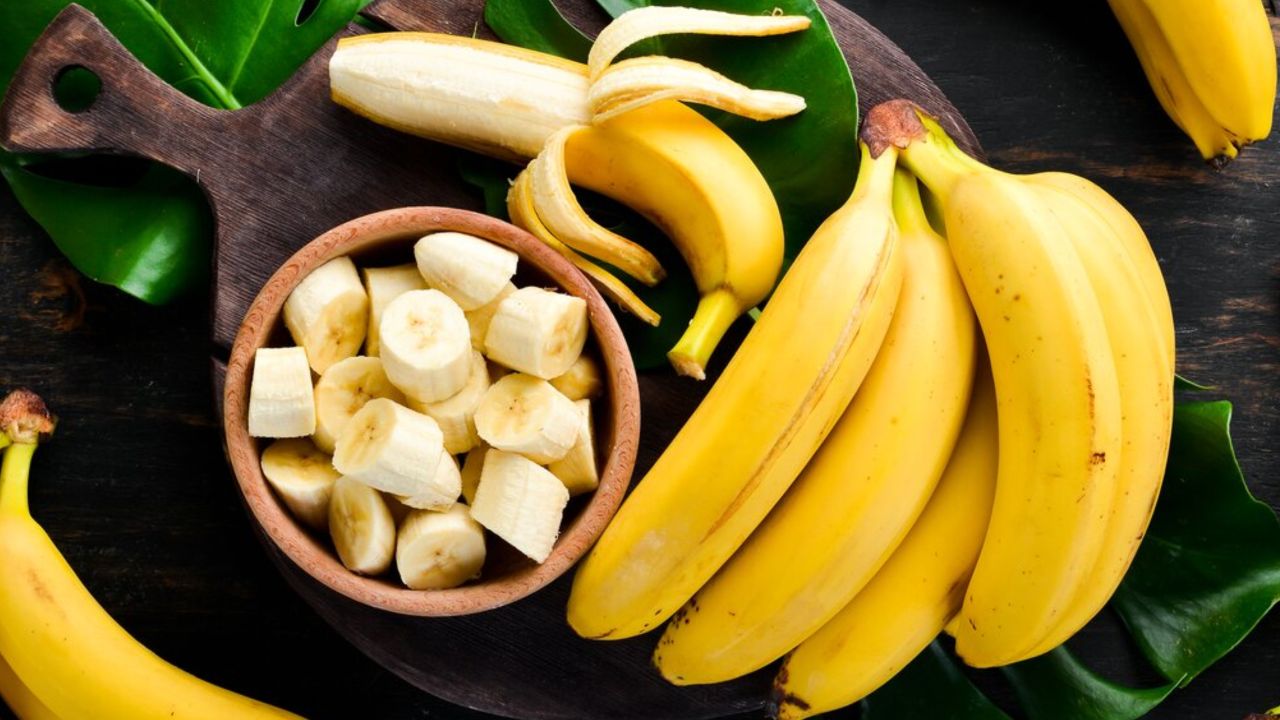8 Incredible Health Benefits of Bananas That Will Surprise You
Bananas are one of the most popular and widely consumed fruits around the globe. Known for their sweet flavor, convenient packaging, and versatility, they have earned their place in the daily diet of millions. Whether enjoyed on their own, added to smoothies, or incorporated into baked goods, bananas are accessible and beloved by people of all ages.
Their widespread availability is matched by their nutritional value, making them a staple in many households. From bustling cities to remote villages, bananas are easy to find and affordable, contributing to their status as a dietary mainstay. This article delves into the myriad health benefits that bananas offer, highlighting why this simple fruit is considered a nutritional powerhouse.
Nutritional Profile
Bananas are not just a tasty snack; they are packed with essential nutrients that contribute to overall health and wellness. Here’s a closer look at the key nutrients found in bananas:
1. Vitamins:
- Vitamin C: Bananas provide a moderate amount of Vitamin C, which is crucial for immune function, skin health, and antioxidant protection.
- Vitamin B6: Bananas are particularly rich in Vitamin B6, which plays a vital role in brain health, metabolism, and the production of neurotransmitters.
2. Minerals:
- Potassium: One of the standout minerals in bananas is potassium. This mineral is essential for maintaining healthy blood pressure, supporting proper muscle function, and balancing fluid levels in the body.
- Magnesium: Bananas also contain magnesium, which is important for muscle and nerve function, bone health, and energy production.
3. Dietary Fiber:
- Bananas are a good source of dietary fiber, particularly soluble fiber known as pectin. This type of fiber helps regulate digestion, promote satiety, and manage blood sugar levels.
4. Natural Sugars:
- Bananas contain natural sugars such as fructose, glucose, and sucrose. These sugars provide a quick source of energy, making bananas an excellent choice for a pre-or post-workout snack.
Comparison with Other Fruits or Foods:
When compared to other fruits, bananas are unique in their nutrient profile. While fruits like apples and oranges are also nutritious, bananas offer a higher concentration of potassium and Vitamin B6. For instance, an average banana provides about 12% of the recommended daily intake of potassium, while a medium apple offers only about 6% of the daily value.
In comparison to other snack options, bananas are a healthier choice due to their low-calorie content and natural sugars, which provide a more sustained energy release compared to processed snacks high in refined sugars and unhealthy fats.
Overall, the nutritional profile of bananas makes them a valuable addition to a balanced diet, offering a range of vitamins, minerals, fiber, and natural sugars that support various aspects of health.
Top 8 Health Benefits of Bananas
Bananas: Nature’s sweet energy boost. It is a versatile fruit packed with potassium and essential nutrients for a healthy lifestyle. Beyond its sweet taste and convenient portability, the banana offers many health benefits. Below are some of them:
1. Cardiovascular Health
Bananas are more than just a convenient snack; they play a significant role in promoting cardiovascular health. Here’s how the nutrients in bananas contribute to heart health:
1. Role of Potassium:
- Blood Pressure Regulation: Potassium is a key mineral in bananas that helps maintain healthy blood pressure levels. It works by counteracting the effects of sodium in the body. A diet rich in potassium helps relax blood vessels and reduces the risk of hypertension. This mineral is vital for heart function, as it helps regulate the balance of fluids and electrolytes, thus supporting healthy blood pressure.
2. Benefits of Fiber:
- Cholesterol Reduction: The dietary fiber in bananas, particularly soluble fiber like pectin, plays a crucial role in heart health. Soluble fiber helps reduce levels of LDL (bad) cholesterol by binding to cholesterol molecules in the digestive tract and facilitating their excretion. Lowering LDL cholesterol reduces the risk of plaque buildup in the arteries, thereby decreasing the risk of heart disease.
3. Impact on Overall Heart Health:
- Comprehensive Benefits: The combination of potassium, fiber, and antioxidants in bananas contributes to overall heart health. Potassium supports healthy heart rhythms and reduces the risk of stroke. Fiber aids in lowering cholesterol levels and improving blood vessel function. Additionally, bananas contain antioxidants such as dopamine and Vitamin C, which help protect the cardiovascular system from oxidative stress and inflammation.
By incorporating bananas into a balanced diet, individuals can leverage these cardiovascular benefits, promoting a healthier heart and reducing the risk of heart-related conditions.
2. Digestive Health
Bananas are not only a delicious fruit but also a valuable ally for maintaining a healthy digestive system. Here’s how they support digestive health:
1. High Fiber Content and Its Effects on Digestion:
- Digestive Regularity: Bananas are rich in dietary fiber, particularly soluble fiber called pectin. This fiber helps to regulate the digestive process by absorbing water and forming a gel-like substance in the gut. This gel aids in the smooth passage of stool, contributing to more regular bowel movements and overall digestive comfort.
2. Role of Bananas in Preventing Constipation and Promoting Regular Bowel Movements:
- Constipation Prevention: The fiber in bananas helps to bulk up the stool and promote its passage through the intestines, reducing the likelihood of constipation. The soluble fiber found in bananas absorbs excess water and helps maintain stool consistency, which is crucial for preventing constipation.
- Promoting Regularity: Regular consumption of bananas can help maintain bowel regularity. By ensuring that the digestive system is functioning smoothly, bananas contribute to a balanced and comfortable digestive experience.
3. Prebiotics and Their Impact on Gut Health:
- Prebiotic Benefits: Bananas also contain prebiotics, which are non-digestible carbohydrates that serve as food for beneficial gut bacteria. The prebiotic effect of bananas supports the growth and activity of probiotics (good bacteria) in the gut.
- Gut Health Improvement: By nourishing these beneficial bacteria, prebiotics help maintain a healthy gut microbiome, which is crucial for efficient digestion, immune function, and overall health. A well-balanced gut microbiome contributes to reduced inflammation, enhanced nutrient absorption, and improved digestive health.
Incorporating bananas into your diet can enhance digestive health through their high fiber content, ability to prevent constipation, and prebiotic benefits, making them a valuable component of a gut-friendly diet.
3. Energy and Performance
Bananas are not just a nutritious fruit; they are also a fantastic source of quick, sustainable energy. Here’s how they can benefit your energy levels and athletic performance:
1. Natural Sugars as Quick Sources of Energy:
- Types of Sugars: Bananas contain a mix of natural sugars, including fructose, glucose, and sucrose. These sugars are rapidly absorbed into the bloodstream, providing a quick energy boost. Fructose is slowly released into the blood, while glucose and sucrose provide immediate energy, making bananas an ideal choice for replenishing energy levels quickly.
- Sustained Energy: The combination of these sugars ensures a steady release of energy, which can help maintain endurance during physical activities and prevent energy crashes.
2. Benefits for Athletes and Physically Active Individuals:
- Pre- and Post-Workout Fuel: For athletes and those engaged in physical activities, bananas are an excellent pre-workout snack, offering a quick source of energy and essential nutrients to fuel performance. After exercise, bananas help replenish glycogen stores, support muscle recovery, and reduce muscle cramps due to their potassium content.
- Electrolyte Balance: The potassium in bananas helps maintain electrolyte balance, which is crucial during intense physical exertion to prevent dehydration and muscle cramps.
3. Comparison with Energy-Boosting Snacks or Supplements:
- Natural vs. Processed: Unlike many processed energy snacks and supplements that can be high in refined sugars and artificial additives, bananas offer a natural source of energy with additional health benefits. They provide a combination of vitamins, minerals, and fiber, making them a more wholesome option compared to energy bars or sugary drinks.
- Balanced Nutrition: While energy supplements often focus solely on quick energy boosts, bananas offer a balanced profile of nutrients that support overall health. Their natural sugars provide a more gradual and sustained energy release, avoiding the spikes and crashes often associated with processed snacks.
Incorporating bananas into your diet can enhance energy levels and performance, making them a practical and healthful choice for athletes and anyone needing a natural energy boost. Their blend of natural sugars, potassium, and other nutrients supports both immediate and sustained energy needs, setting them apart from more processed alternatives.
4. Mood and Mental Health
Bananas are not only beneficial for physical health but also play a role in supporting mental well-being. Here’s how their nutrients can positively impact mood and mental health:
1. Impact of Vitamin B6 on Neurotransmitter Function:
- Neurotransmitter Synthesis: Vitamin B6, found abundantly in bananas, is crucial for the synthesis of neurotransmitters such as serotonin and dopamine. These chemical messengers are essential for transmitting signals in the brain and are involved in regulating mood, emotion, and overall mental function.
- Brain Health: Adequate levels of Vitamin B6 support optimal brain health and cognitive function. By assisting in neurotransmitter production, Vitamin B6 helps maintain emotional balance and mental clarity.
2. Role of Tryptophan in Serotonin Production:
- Tryptophan Content: Bananas contain tryptophan, an amino acid that the body converts into serotonin. Serotonin is often referred to as the “feel-good” neurotransmitter because it plays a key role in regulating mood, sleep, and appetite.
- Mood Regulation: Increased levels of serotonin can lead to improved mood and a sense of well-being. By contributing to serotonin production, bananas help support a positive mood and emotional stability.
3. Potential Effects on Mood and Mental Well-Being:
- Mood Enhancement: Regular consumption of bananas can contribute to better mood regulation and mental health due to their Vitamin B6 and tryptophan content. These nutrients help enhance the brain’s ability to manage stress, anxiety, and depressive symptoms.
- Overall Well-Being: In addition to their direct impact on neurotransmitters, bananas provide a steady release of energy and essential nutrients, which can help maintain overall mental well-being and reduce feelings of fatigue or irritability.
Incorporating bananas into your diet can support mood and mental health by boosting neurotransmitter function, supporting serotonin production, and contributing to overall emotional well-being. Their nutritional profile offers a natural way to enhance mental health and maintain a positive mood.
5. Weight Management
Bananas can be a valuable asset in weight management and weight loss plans due to their unique nutritional properties. Here’s how they contribute to maintaining a healthy weight:
1. Role of Bananas in Feeling Full and Reducing Cravings:
- Fiber Content: Bananas are rich in dietary fiber, particularly soluble fiber like pectin. This fiber promotes a sense of fullness by absorbing water and expanding in the stomach, which helps to reduce hunger and control appetite.
- Craving Control: The satiety provided by bananas can help curb cravings for less healthy snacks, making them a satisfying and nutritious choice between meals.
2. Low Calorie Density and High Satiety:
- Caloric Efficiency: Bananas have a relatively low-calorie density, meaning they provide fewer calories per volume compared to many other snacks. This makes them a great option for those looking to reduce overall calorie intake while still enjoying a satisfying portion.
- Satiety Factor: The combination of fiber and natural sugars in bananas contributes to prolonged satiety, helping to manage hunger and support weight control efforts.
3. Use in Weight Loss or Management Plans:
- Incorporation into Diets: Bananas can be seamlessly incorporated into various weight loss or management plans. They can be eaten on their own, added to smoothies, or used in healthy recipes, providing a nutritious and filling option without excessive calories.
- Balanced Nutrition: Unlike many processed diet foods, bananas offer a balance of essential nutrients, including vitamins, minerals, and antioxidants, without compromising weight management goals. They provide energy and nutrition in a way that supports overall health while aiding in weight control.
Incorporating bananas into your weight management plan can help control hunger, reduce cravings, and provide a nutritious, low-calorie option that supports overall health. Their ability to promote satiety and their balanced nutrient profile make them a smart choice for maintaining a healthy weight.
6. Bone Health
Bananas play a beneficial role in maintaining strong and healthy bones, thanks to their rich mineral content. Here’s how they contribute to bone health:
1. Importance of Magnesium and Potassium in Maintaining Bone Density:
- Magnesium: Bananas are a good source of magnesium, a mineral that is essential for bone health. Magnesium helps in the formation of bone matrix and plays a crucial role in the absorption of calcium, which is vital for maintaining bone density and strength.
- Potassium: Potassium, also found abundantly in bananas, helps maintain bone health by reducing calcium loss through urine. Adequate potassium levels are linked to better bone density, as it helps to neutralize acids that can otherwise lead to calcium loss from bones.
2. Impact on Bone Health and Prevention of Osteoporosis:
- Bone Density: By providing essential minerals like magnesium and potassium, bananas support the maintenance of bone density. This can be particularly beneficial as one ages, helping to prevent the gradual loss of bone mass and strength.
- Osteoporosis Prevention: Regular intake of bananas can contribute to the prevention of osteoporosis, a condition characterized by weakened bones and an increased risk of fractures. The combination of potassium and magnesium supports bone mineralization and overall bone health, reducing the risk of developing osteoporosis.
Incorporating bananas into your diet can help support bone health by providing essential minerals that maintain bone density and prevent bone-related conditions. Their nutrient profile makes them a valuable addition to a diet aimed at promoting strong and healthy bones.
7. Skin Health
Bananas offer more than just nutritional benefits; they also contribute to healthy, radiant skin. Here’s how they support skin health:
1. Benefits of Vitamin C and Antioxidants for Skin Health:
- Vitamin C: Bananas are a good source of Vitamin C, an essential nutrient known for its skin benefits. Vitamin C is crucial for collagen production, which helps maintain skin elasticity and firmness. Collagen is a protein that supports skin structure and reduces the appearance of fine lines and wrinkles.
- Antioxidants: Bananas contain antioxidants such as dopamine and Vitamin C, which help combat oxidative stress and protect the skin from damage caused by free radicals. These antioxidants contribute to a healthier complexion by neutralizing harmful free radicals that can accelerate skin aging.
2. Potential Anti-Aging Effects and Skin Hydration:
- Anti-Aging Effects: The antioxidants in bananas help reduce oxidative damage to skin cells, which can slow down the aging process. By supporting collagen production and reducing inflammation, bananas can help diminish the appearance of wrinkles and improve overall skin texture.
- Skin Hydration: Bananas also have hydrating properties due to their natural moisture content. They help maintain skin hydration by providing essential nutrients that support the skin’s ability to retain moisture. Well-hydrated skin appears plumper and more youthful, enhancing its overall appearance.
Incorporating bananas into your diet can contribute to healthier, more youthful skin by providing essential nutrients that support collagen production, combat oxidative stress, and maintain hydration. Their combination of Vitamin C and antioxidants makes them a valuable addition to a skincare-friendly diet.
8. Immune System Support
Bananas are not just a delicious fruit; they also play a role in supporting a robust immune system. Here’s how their nutrients contribute to immune health:
1. Role of Vitamin C in Boosting Immunity:
- Vitamin C Benefits: Bananas contain Vitamin C, which is well-known for its immune-boosting properties. Vitamin C enhances the production and function of white blood cells, which are crucial for defending the body against infections and pathogens. It also acts as an antioxidant, protecting immune cells from oxidative stress and damage.
- Immune Response: Regular consumption of Vitamin C helps to strengthen the immune system and improve the body’s ability to respond to illnesses. It can also shorten the duration of common colds and support overall immune function.
2. Other Nutrients that Support Immune Function:
- Vitamin B6: Bananas are rich in Vitamin B6, which plays a key role in immune health. Vitamin B6 supports the production and function of antibodies and other immune cells, contributing to a well-functioning immune response.
- Potassium: This essential mineral helps regulate fluid balance and supports cellular function, including the activity of immune cells. Adequate potassium levels are important for maintaining a healthy immune system.
- Magnesium: Found in bananas, magnesium is involved in various biochemical reactions that support immune health. It helps regulate the function of immune cells and reduces inflammation, enhancing overall immune defense.
By including bananas in your diet, you can benefit from their Vitamin C, Vitamin B6, potassium, and magnesium content, all of which support and strengthen the immune system. Their combination of nutrients contributes to a well-rounded approach to maintaining a healthy immune function and overall wellness.
Additional Considerations
While bananas are generally a healthy and versatile fruit, there are a few additional considerations to keep in mind when incorporating them into your diet:
1. Potential Allergens or Sensitivities:
- Allergies: Although rare, some individuals may have an allergy or sensitivity to bananas. Symptoms can include itching or swelling of the mouth and throat, hives, or gastrointestinal discomfort. If you experience any adverse reactions after consuming bananas, it’s best to consult with a healthcare provider.
- Cross-Reactivity: People with latex allergies may experience cross-reactivity with bananas due to similar proteins. If you have a latex allergy and suspect a banana sensitivity, consult with an allergist for appropriate testing and advice.
2. Best Ways to Incorporate Bananas into a Balanced Diet:
- Variety of Uses: Bananas are incredibly versatile and can be included in a variety of dishes. Enjoy them fresh as a snack, add slices to cereal or yogurt, blend them into smoothies, or use them in baking recipes like muffins and bread.
- Complementing Other Foods: Combine bananas with protein or healthy fats to create balanced snacks. For example, pair banana slices with nut butter or add them to a bowl of oats for a nutrient-rich meal.
- Creative Recipes: Explore creative ways to use bananas, such as in smoothies, energy bars, or frozen banana pops. Their natural sweetness can also be used to reduce added sugars in recipes.
3. Portion Control and Moderation:
- Serving Size: While bananas are nutritious, they should be eaten in moderation as part of a balanced diet. A standard serving size is one medium banana, which provides approximately 100 calories.
- Balanced Diet: Ensure that bananas are part of a varied diet that includes a wide range of fruits, vegetables, proteins, and whole grains. This helps to maintain a balanced intake of nutrients and supports overall health.
- Moderation: Overconsumption of bananas can contribute to excessive calorie intake and imbalance in nutrient ratios. Enjoy bananas as a part of a diverse diet to reap their benefits while maintaining overall dietary balance.
By considering these factors, you can effectively incorporate bananas into your diet while addressing potential sensitivities and ensuring that they complement a balanced nutritional plan. Their versatility and health benefits make them a valuable addition to a variety of meals and snacks.

























